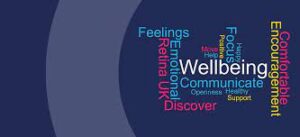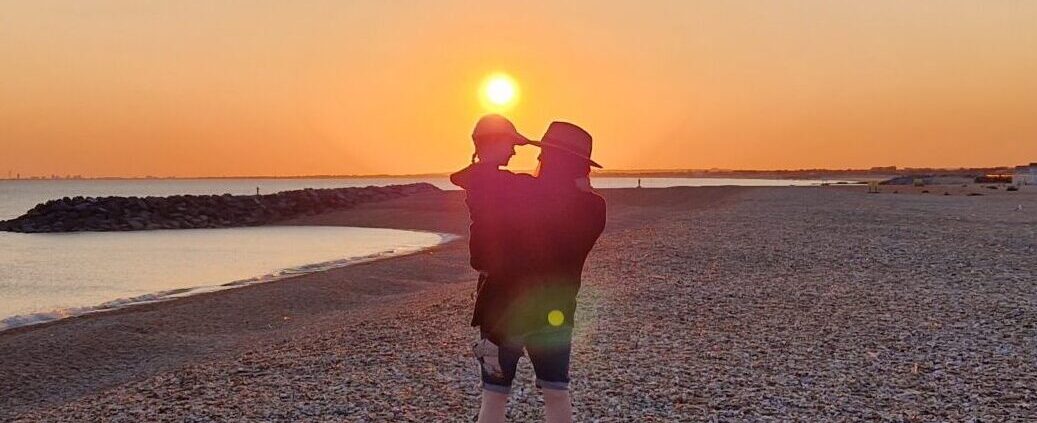 I have now completed the Discover Wellbeing course run by the amazing people at Retina UK. I opted for a supported journey so every week I would complete a module and then talk it through with a volunteer, who had been matched with me, to go through the material.
I have now completed the Discover Wellbeing course run by the amazing people at Retina UK. I opted for a supported journey so every week I would complete a module and then talk it through with a volunteer, who had been matched with me, to go through the material.
It was a great and very therapeutic experience and after the first 2 sessions, my weekly chats felt like virtual coffee mornings with an old friend. My support volunteer was further along in her sight loss journey but like me, she was married and a mum and had faced sight loss as an adult.
We had 5 modules to cover;
Diagnosis
Keep calm and carry on – largely denial
Point of impact – the point where your diagnosis changes something fundamental in your life like losing your licence or having to step away from your current career.
Coming out as a VIP – accepting your diagnosis and starting to use mobility aids and being open with those around you.
Finding a way through – Embracing your new normal and thriving in your new life
My support volunteer had fully immersed herself into the visually impaired community and had many visually impaired friends. In contrast, she was the second blind person I had spoken to in my life.
She gave me hope that there can be a good life on the other side. She is still able to work, support her family, socialise, be a great mum and wife and as we shared and laughed like two school friends; I finally felt I could breathe. In those conversations I didn’t feel alone. She understood all of it. My fears, my embarrassing slip ups, my total disdain for cold and brutal consultants and the painful loss of what I thought my life would be and navigating a new way for myself.
Both of us are no strangers to hospital appointments but on the road to inevitable sight loss, we have a very different health service experience to most. The NHS is truly amazing and we should all feel privileged to have it but once you get a disease they can’t treat, they seem to flip the switch. You feel like you’ve been transported to a floor that few get to see. A floor that talks over you, about you and has absolutely no regard for your emotional wellbeing whatsoever. Your appointments are long, often uncomfortable and always a little pointless. They update your file with the details of your tests and scans, gaze at you with sadness, often have another look or get a student to grab your appointment as an opportunity to look at you because you’re an interesting case. Then they send you home to continue going blind. It feels like a tick box exercise.
We talked at length about the little things I say and do to hide my diagnosis. How my friends have reacted. The lack of independence. The kindness and at times appalling behaviour of friends and strangers. The inaccessible job market and the never ending pity you receive from people who can’t quite believe you have not decided to call it quits yet. Alongside that, you have the folk that do anything to avoid mentioning it; even if that means avoiding you altogether. Losing friends when facing an incurable disease isn’t new and many people in my situation or similar have experienced it.
I learned a lot and at times, it wasn’t easy to accept that one of the most unsupportive people in this new chapter was me. In my grief I had stopped doing so many things I loved. I have been filling my time and headspace with negative thoughts and activities. I was feeling left behind by people in my life and by society and in turn I had stopped showing up for myself.
I had abandoned healthy positive behaviours and replaced them all with negative ones.
- Scrolling the internet
- Falling into YouTube rabbit holes
- Spending time alone
- Over eating
- Consuming more alcohol
The Discover Wellbeing course encouraged its participants to focus on areas of protective daily behaviours that we could develop to improve and strengthen our mental and physical wellbeing. These areas are:
Move – Any physical activity or exercise
Focus – Any task that requires or draws attention. Reading, meditation, gardening, cooking etc
Discover – Learning something new
Communication – Regular contact with friends, family, neighbours and colleagues.
Help – Assisting others in the community
Seems so simple but when I tried to list activities that I participated in within each category, I realised that I had actually withdrawn from many things.
I had work to do.
The course also assumed that many VIPs have plenty of support and that we just need to tap into it to benefit from it. That’s not reality for many of us. Most adults have a thriving social life and busy week led purely by employment. However, according to the RNIB, only one in four visually impaired people are employed. Therefore when you consider that your friends, family and neighbours are also probably working, you can see how isolation occurs and for some it’s inevitable.
I examined my 3 circles of support:
Inner circle – family and close friends that I trust with anything
Second circle – friends and colleagues that I may be able to rely on sometimes
Outer circle – neighbours, acquaintances and hobby groups.
It was sobering to realise that I didn’t have many people I could call, lean on or go out with. I guess with sight loss it’s easier and sometimes forced upon you to almost retreat away from your old life. I have lost a lot and I have definitely retreated. I understand why and I’m going to be kind to myself about it.
Armed with this new knowledge that there are people like the volunteer support at Retina UK, I no longer want to retreat, I want to advance. I want to move forward and move on.
Remember the cactus quote?
“Life may give you a cactus but you don’t have to sit on it”.
